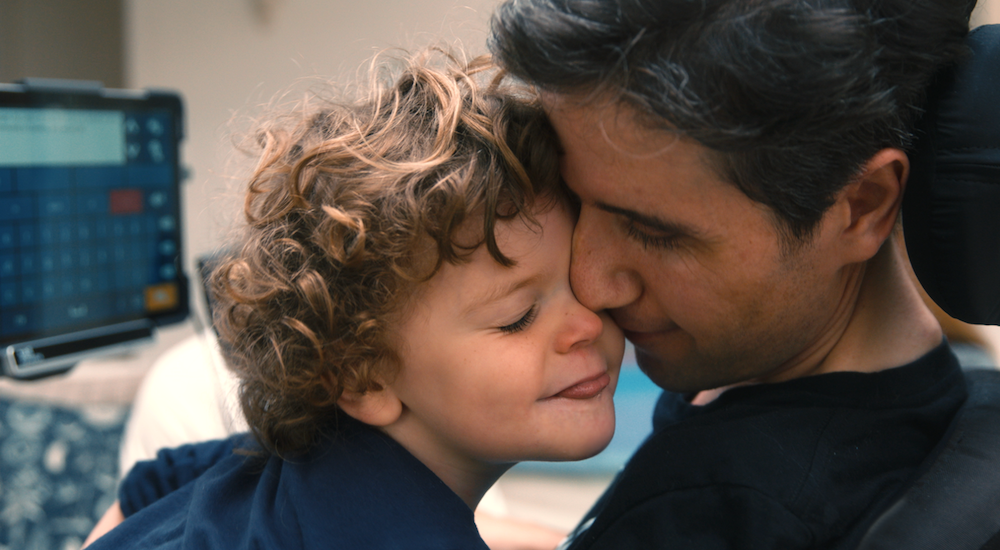Say what you will about the Trump presidency, but it shone a bright light on many activists who have been working for years, making some household (or, more appropriately, Twitter-timeline) famous. Ady Barkan had been involved in politics for a long time, primarily advocating for better fiscal policy. Not Going Quietly, a personal documentary about Barkan’s health care activism over the last few years, paints a moving portrait of one man, diagnosed with ALS at 32, and determined to use every minute he has left.
The film mostly proceeds in chronological order, from Barkan’s ALS diagnosis in 2016 up to 2019. However, Barkan’s intermittent voiceovers in a computerized voice hint at the deterioration to come, even as you first see him walking, talking, and moving normally. Likely due to narrative necessity, some scenes shift between him in and out of a wheelchair or his speech more or less slurred. It’s a jarring experience but never lets you forget how quickly the disease is progressing.
After his diagnosis, Barkan received a crash course in the many difficulties of the American health care system. However, he never wavered from his activism roots, even going to his insurance company in person for their explanation of why a breathing machine he needed was deemed “experimental.” Soon, he shifts his whole focus onto healthcare reform and goes viral for confronting then-Arizona Senator Jeff Flake on an airplane in 2018. The documentary reveals that these sorts of moves were incredibly deliberate. Barkan was quick to realize that his body, a physical realization of illness, was a natural attention-getter when it came to these issues. Who could stomach telling someone with ALS that he was wrong? Surrounded by a team of strong women activists around him, he was quick to leverage the attention into a massive Twitter following and eventually a bus tour to flippable counties in the 2018 election.
Though these public moves are strategic, the documentary doesn’t shy away from the physical and mental hardships of the disease. Barkan’s wife, Rachel, is honest about how difficult it’s been to juggle their young son (and later a daughter) while also learning how to be a caregiver. While they do have help in the form of a close friend and eventually a nurse, many times it’s Rachel who helps him eat and dress. “The only thing I can do now is boss people around,” Barkan jokes. Still, it’s abundantly clear that he treasures every moment with his kids, all too aware that he has precious little time to make memories with them.
The filmmakers don’t dwell much on darkness, but that may just be Barkan’s attitude. He’s always joking and making light of his situation even when he must shower at a road stop, completely at the mercy of his friend to wash him. Director Nicholas Bruckman doesn’t rely much on talking-head interviews either. Instead, the footage is full of kinetic energy, trying to keep up with their subject as he continues in his work at breakneck speed, from speaking at rallies across the country to protesting the Brett Kavanaugh nomination. The addition of home videos and iPhone-filmed clips lend to the documentary’s intensely personal feel.
The film often feels like it’s following two barreling trains: the progression of ALS and Barkan’s skyrocketing career. While he’s juggling whether to get a tracheotomy, which means losing a treasured tool, his voice, he’s also speaking more than ever before at events, on podcasts, and directly to politicians. Bruckman cleverly keeps a light touch, letting Barkan’s natural charm and immeasurable hardships tell their own story. As expected, it’s incredibly moving and inspiring and you can’t help but admire and cheer on this man and his family, determined to do all he can in the few years he has left. “The weaker I get, the louder I become,” he proclaims, and this documentary is the testimony.

